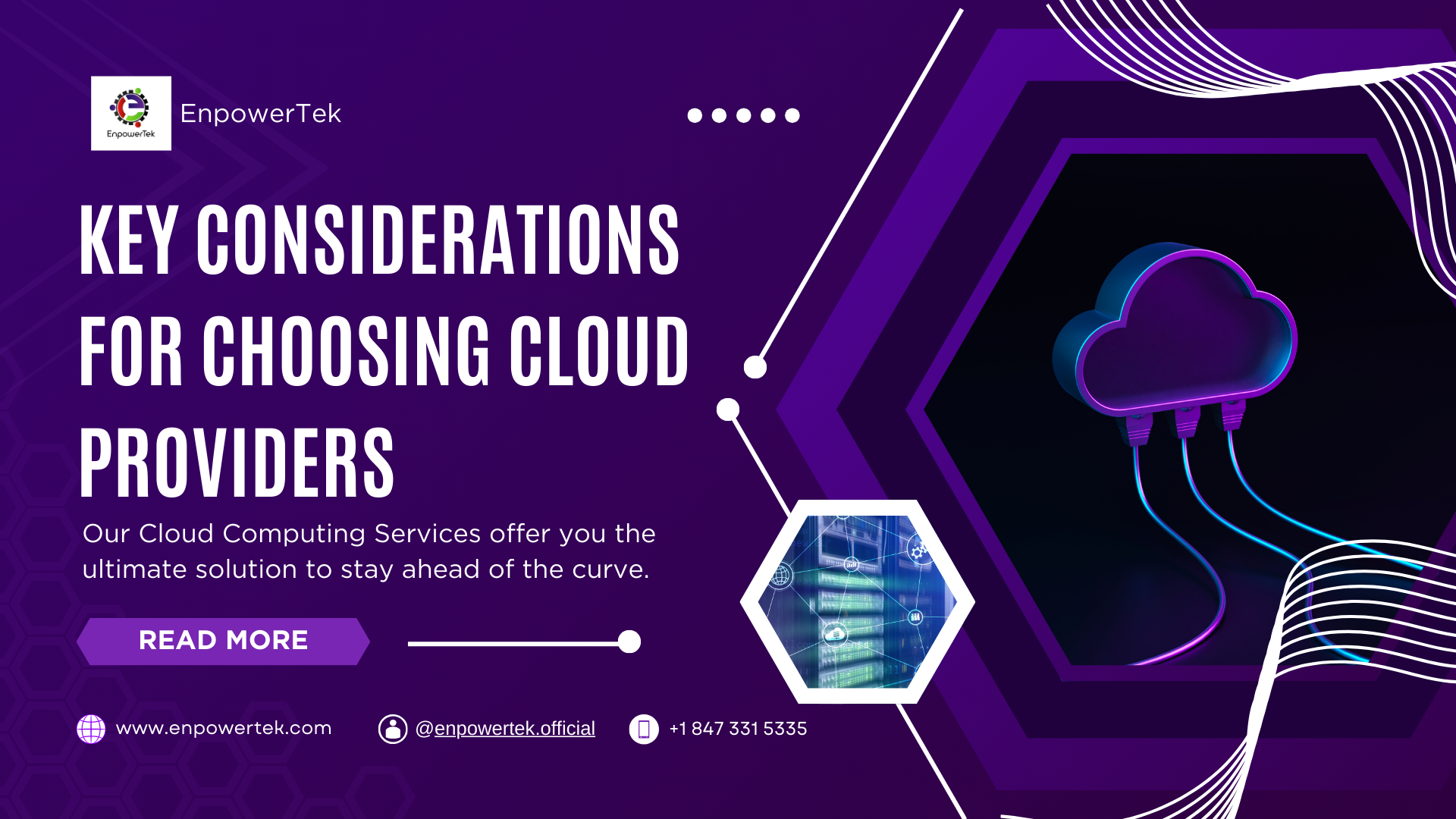
author: Enpowertek Admin
date: September 26, 2024
Firstly, choosing a proper cloud provider that would significantly benefit your business is important. It determines all aspects ranging from the protection of the data you hold to the ability level you have in expanding the operations. To make the best choice, consider these three critical factors: performance, security, and cost. These criteria may be considered while comparing different methods.
Performance and Reliability
Availability and dependability are some of the factors one has to consider while selecting a cloud service provider. Your business is, therefore, defined by how efficient the cloud service is and the number of outages it has. Check for providers that guarantee high uptime, usually presented as a percentage. For example, a 99. A 9% uptime guarantee means your service may be unavailable for not more than 8.76 hours per year.
Check the service level agreements (SLAs) to rate the provider’s performance. They state how you are supposed to perform and the remuneration you will likely receive in case of poor performance. As a third, you should emulate customer feedback and third-party operational performance indicators. With these insights, you will be in a position to compare how the provider happens to be performing in the different scenarios.
A final concept is the provider’s network topology. A strong network foundation results in quick data retrieval and transmission rates. This is because the more data centers the service provider has and the closer they are to the user, the better the services to be expected should be. Low latency and high speed are highly important for the organization’s smooth functioning, especially for businesses that require real-time data processing.
Security Measures
Security is the major concern that organizations need to consider when choosing the right cloud provider. Your cloud provider will have your data, so the cloud provider you choose should have good security measures in place. The first step is to ensure the provider meets the guidelines and the laws of the country in which you reside. It also includes compliance badges such as ISO 27001, SOC 2, and GDPR, which ensure that the provider’s security practices are top-notch.
Consider the security considerations that the provider is providing with their hosting services. End-point security is crucial as it provides security to data which remains static and travels in networks. Ensure that the provider employs secure protocols of data encryption and that it has a proper method of managing encryption keys. Also, learn about the provider’s access controls and its modes and methods of authenticating such access. Well-known measures include, where more than one means of identification is needed before access is granted to an account, multi-factor authentication (MFA).
You must also learn about the provider’s experience managing incidents and disaster recoveries. A dependable provider will have a proper course of action in the event of data privacy violation and data loss. The immediate goals for this plan should involve schedules for the backup of data, its redundancy, and the strategy to be adopted in case of a service disruption.
Cost and Pricing Models
It is very important to learn as much as possible about the possibilities offered by cloud providers regarding the costs and possibilities of setting various prices. In most cases, cloud services employ various pricing options such as pay-as-you-go, reserved instances, and spot instances. All the models have their benefits, and each can be relevant for different uses in the business environment.
The pay-as-you-go deals cost you the amount you use, in contrast to other models. It is also highly adaptable and perfect for companies with stochastic service demands. However, the user needs to be cautious in their use to avoid running into other costs which are sometimes unexpected. Savings are available for committing certain resources over a certain period. This model suits businesses that do not record fluctuations in their workload, as it is relatively more expensive than other models. While spot instances enable you to bid on unused capacity for unparalleled lower rates, they can be terminated anytime.
Meanwhile, think of other costs that may be incurred in the process. However, some providers may charge additional charges for bandwidth usage, API calls or other services included in the support menu. Therefore, one should go through the cost information provided by the healthcare provider aggressively and request the provider explain all possible charges in detail. Compare these costs to the current and future expenditures to give you a clue on the best return on your investment.
Customer Support and Service Quality
A good example of a factor that may influence your experience as a cloud provider is excellent customer support. You need to consider seeking providers with helpful and informed support crews with round-the-clock services. These include the phone, chat box and email support, and one should consider the response rate and efficiency of the solution given. Also, consider its helpful resources, including documentation, tutorials and community, to assist with challenging situations or deploy the best cloud solutions setting. Quality support is important as it eliminates interrupting your business activities due to the apparent problems you have or the questions you may come across.
In conclusion, choosing the right cloud provider involves evaluating performance, security, and cost. A provider that excels in these areas will support your business’s growth and ensure smooth, secure operations. Take the time to research and compare options thoroughly to find the best fit for your needs.